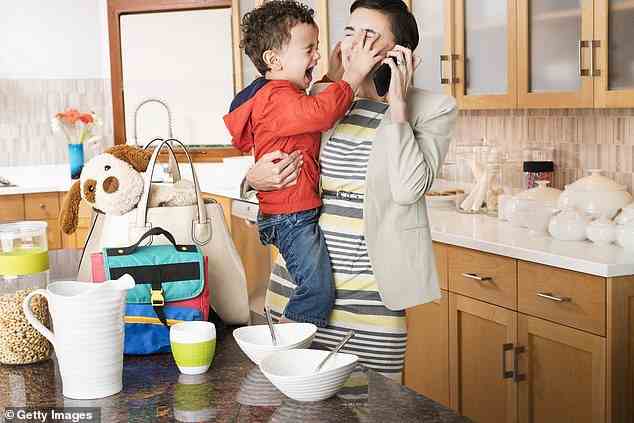The ‘supermum’ description is one I’ve always loathed.
OK, it’s catchy, a flattering parallel with good old Superman, who flies about solving the world’s problems with his pants outside his tights while holding down a day-job on a New York newspaper.
But when you are an actual mum on a weekday morning, you’re just grateful to have time to pull on your pants and tights in any order at all, in between checking lunches, PE kits, homework diaries, spurious claims to have a tummy ache, infuriating WhatsApps and work emails.
And that thing flapping behind you is not a Superman-scarlet flying cloak: it’s a fractious toddler who reckons that unrolling 20ft of toilet paper is more fun than putting on his shoes for nursery.
So surely nobody is surprised by the result of Bupa UK’s survey showing that a majority of mothers feel exhausted by the pressure to be a ‘supermum’.
In fact, I’m only surprised the figure wasn’t more than 63 per cent.
Additionally, nearly half struggled to ask for their partner’s support and a third felt they had to put on a facade of being infallible. Some felt their mental health at risk.
Never mind ‘supermum’, today’s mothers are permanently ‘superstressed’. To levels, I would say, never felt before.
To an extent these feelings aren’t new. Arguably, becoming a mother has always opened women up to being judged by society and found wanting.
Surely nobody is surprised by the result of Bupa UK’s survey showing that a majority of mothers feel exhausted by the pressure to be a ‘supermum’. [File image]
Back in the 1980s, with a small child and a baby, I wrote a book, a survival guide called How Not To Be A Perfect Mother. It was a reaction against the impossible expectations for mothers that existed even then.
I had been spooked by new-mother ‘typical daily routines’ in baby manuals, whose bossy minute-by-minute guides never seemed to include long bubble-baths with a book, or lines like ‘leave baby with Dad or Grandma, go to pub for an evening with friends’.
It seemed a mother’s happiness was so far down the to-do list it had dropped off the bottom.
So I tapped out the sentence.
‘Any mother would lay down her life for her child, but I see no reason to do it every single day’, and sent out a questionnaire to mothers of three generations – oldest 82, youngest 22 – with basic questions about coping with bathtime, tantrums, rationing TV, refusing to eat, all that.
Answers flooded in, practical and witty and startling.
Often, I gave two contradictory theories about things such as tantrums, so mothers could choose. Then I added my own.

Women today are expected not only to have the perfect home, looks and family but a ‘big’ successful job, too. Alongside that there is the hard economic truth that high UK housing costs and ever-rising utility bills make it essential for most couples to bring in two pay packets or salaries, even if one is part-time
From time to time I still meet women — sometimes abroad, it was translated dozens of times — who have picked up copies and say ‘hello’.
They’re my tribe, the ones who know that there are plenty of random household objects it’s safe to let children play with, that expensive toys don’t solve everything, that having a spotlessly tidy house is not necessarily a sign of virtue and there is no point trying to look like a supermodel when you’re running a human zoo.
They’re the ladies who know that in extremis, toddlers can be kept surprisingly quiet and amused by the simple game of ‘Mummy lying down’.
Just lie down on the floor on your stomach (with a paperback if you like) and allow the infant to crawl all over you.
As long as you feel little feet and hands somewhere, they’re alive. Tell them you’re a giant crocodile and snap occasionally, and they like it even more.

Looking back, I realise that the central message was simply that you’re not in a competition against other mothers, and that there is no perfect standard against which you are being marked
Looking back, I realise that the central message was simply that you’re not in a competition against other mothers, and that there is no perfect standard against which you are being marked.
With love, reasonable attention and basic health and safety precautious, the odds are you’re doing all right.
So how is it that things are even worse now?
Undoubtedly, the rise of social media has played a huge part in fuelling the sense of inadequacy so many women experience.
There was a time when it was fairly easy to laugh at the idea of a perfect, tightly organised yet laughingly, lovingly cheerful supermum, because the image was presented to us mostly at a bit of a distance.
These shiny creatures with swishy hair turned up in TV commercials, smiling at a clean-bottomed baby or a perfect little moppet who really appreciates the Fairy-Liquid softness of their hands.
We could snort amusedly, and remind ourselves that these depictions of maternal perfection — beautiful blow-dry, clothes unsullied by food smears and picture-perfect children — came from cynical male copywriters trying to sell us stuff.
Alternatively, the perfect-mummy image might turn up in a celebrity profile — perhaps of Gwyneth Paltrow or Madonna — and we could just roll our eyes.
We’d reassure ourselves: ‘She’s got two nannies and a housekeeper and a big house. And her agent will have got contractual photo-approval for those smiling shots of her children being angelic!’
Now, in a world of Instagram and Facebook, as soon as a mother gets a moment to glance at her social media her sense of washed-out weariness will be only increased by a slew of carefully curated images: laughing families having time together, fuelled by nutritious yet decorative meals, houses with plumped cushions and beautiful unbroken ornaments on dusted shelves, captions showing soupy gratitude (#blessed! #familyday).
What’s worse is that this stuff comes not only from paid ‘influencers’, whom everyone knows are faking it, but very often from people you actually know or are related to.
The result is that you feel inadequate, disorganised, failing at life and — especially — failing at parenting.
From the images of ‘family perfection’ I see on social media, I am very glad it didn’t exist when I was a young mother.
Social trends have played a part, too. As families have grown smaller so the pressure has risen on mothers to ‘perfect’ their children (as if that were possible!).
Families used to consist of four, five or more children — an all-consuming existence for a mother who had scant time to devote to each child.
Now when it’s rare to have more than two or three babies, the expectation, in an age of continual self-improvement, is that she not only has time to oversee each child’s development but invest in her own career and personal growth.

Undoubtedly, the rise of social media has played a huge part in fuelling the sense of inadequacy so many women experience. [File image]
Women today are expected not only to have the perfect home, looks and family but a ‘big’ successful job, too.
Alongside that there is the hard economic truth that high UK housing costs and ever-rising utility bills make it essential for most couples to bring in two pay packets or salaries, even if one is part-time.
When I wrote my books, many women had some financial flexibility in the amount of work they had to do.
Now, of course, most families need two incomes to survive in a world where mortgages now account for around 55 per cent of take-home pay, compared to 35 per cent in the early 1980s.
Guilt falls particularly on mothers. Back in the 80s — doing work-life balance seminars in offices — I was still able to say that working-mother guilt was pointless and absurd.
If you’re feeling cripplingly guilty about working away from home, give up the paid job, I advised, and accept that your career is temporarily on hold.
If you can’t do that for economic reasons, then there’s no sense in being guilty. The best you can do is to soldier through it together, openly and honestly confronting the problems together as a family.
Of course there would be compromise, because life is not perfect.
Like most women I knew in this situation, though I had a very fun job I often turned down big working chances simply because they would have up-ended family life: one longish trip to China, one to Borneo, were particularly painful to lose.
I know lawyers, GPs and businesswomen who could have been far more grand by now if they hadn’t slowed down; others who stormed ahead simply because their partners had the ability to help them more than most.
Now, even taking economic necessity out of the equation, I think it’s harder for a woman to downsize a career.
These days people are expected to have a work ‘brand’, on LinkedIn or other sites, and because of social media everyone is watching, thinking you are a bit of a professional loser if your ‘brand’ doesn’t continue to grow.
For those women who do drive ahead in their careers, people are probably murmuring ‘what about her children? They must hardly see her . . .’ Lose both ways.
No wonder one in five in the survey felt their mental health suffered.
![Like most women I knew in this situation, though I had a very fun job I often turned down big working chances simply because they would have up-ended family life: one longish trip to China, one to Borneo, were particularly painful to lose. [File image]](https://allnewspresscdn.cloudspecter.com/deutsch/wp-content/uploads/2022/03/1646787837_474_LIBBY-PURVES-It-has-NEVER-been-more-stressful-to-be.jpg)
Like most women I knew in this situation, though I had a very fun job I often turned down big working chances simply because they would have up-ended family life: one longish trip to China, one to Borneo, were particularly painful to lose. [File image]
And no wonder a prevailing sense of guilt and inadequacy leads to overcompensating when parents do see their children: note the desperate, perfectionist helicopter-parenting you see in holiday resorts or weekends at the leisure centre, as children who probably want to hang about pointlessly with their peers suffer constant anxious parenting and coaching and aren’t allowed to make invigorating mistakes by themselves.
Meanwhile, for mothers (fathers seem more chilled) there is even social pressure from noisy ‘wellness’ gurus, telling us all off for not meditating daily at a set time and finding importantly organic new ways of becoming our physical and aesthetic best at all times.
And while the survey suggests that women are helped by ‘communicating through parenting groups’, there are perils there, too.
Not only with Mumsnet’s more harpy-ish serial posters joyfully disapproving of one another’s domestic details, but with the new imposition of WhatsApp groups.
While I loved my school-gate mother friends and many remain good mates, I am quite glad that I did it before smartphones created the tyranny of the class WhatsApps, resulting in messages buzzing from the minute you get up to the moment you fall asleep.
These would be wonderful if they consisted of 30 or so sensible co-operative fellow mums exchanging important information about snow days, outgrown blazers or World Book Day (‘just go as a Muggle, in ordinary clothes! But can lend witch’s hat from last year if you like’).
Unfortunately, younger mothers tell me that like all social sites they can get drowned by the needy, the boastful, the bossy, and the vapidly chatty.
‘Has anyone else’s child been picked for the sports team?’ is a typical WhatsApp opener.
As for the ones that inquire along the lines of, ‘Is it just Jasper who’s been invited to the gifted and talented seminar next week?’ it can be enough to make you chuck your phone in the drawer.
But you can’t because these groups can make a woman feel so persecuted that she daren’t even turn them off, because ‘Susie has left the group’ will set them all to judging her.
Enough! We need more humour, more humanity, less humble bragging and less easy judgment about how women’s family lives work out.
We need fathers to take on responsibility not just for the fun things but the daily emotional work, remembering dates and birthdays and in-laws.
Mothers, too, need to feel free to chill out, relax a bit, to trust their partners and not complain when the said fathers take their turn but then return the children in wrong clothes or mismatched socks.
We need to laugh at ourselves, kindly. We must not let the new generation of girls, growing up and falling in love, become afraid of the pressures of perfection and wonder whether they will ever measure up to the high, impossible ideals of perfect-motherhood.
They won’t. Nobody ever has.

